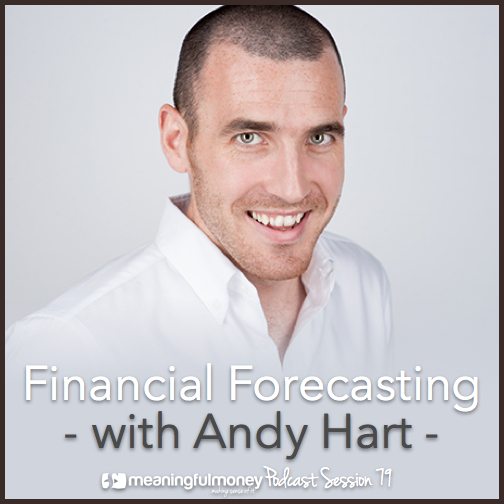 Welcome, friends, to session 79 – hope this finds you well and raring to go to learn more about personal finance. Today I’m going to be talking to Andy Hart, a friend and kindred spirit in many ways. He’s a financial planner based up in London and has a particular specialism in financial forecasting. Hopefully this kind of forecasting is more effective than Michael Fish in the clip there. More on this coming up…
Welcome, friends, to session 79 – hope this finds you well and raring to go to learn more about personal finance. Today I’m going to be talking to Andy Hart, a friend and kindred spirit in many ways. He’s a financial planner based up in London and has a particular specialism in financial forecasting. Hopefully this kind of forecasting is more effective than Michael Fish in the clip there. More on this coming up…
Click to Listen
Podcast: Subscribe in iTunes | Play in new window | Download
As usual, after I’ve chatted with Andy, I’m going to look at the most recent reviews that have been left by listeners, and announce the next session topic. If this show is of any use to you, it would help me massively if you would take the time to leave me a review on iTunes. This has a huge impact on keeping me near the top of the rankings, which in turns helps more people to find the show and to subscribe. I’ll remind you again at the end of the show, but if you want to do it right now just click the big red button below:
But first…
Sponsor Message
 This podcast is brought to you with the help of Seven Investment Management, a firm of investment managers based in London. They put their name to my show and to my site and videos because they believe in what I’m doing, and I’m very grateful for their support. You can see what they’re up to at 7im.co.uk
This podcast is brought to you with the help of Seven Investment Management, a firm of investment managers based in London. They put their name to my show and to my site and videos because they believe in what I’m doing, and I’m very grateful for their support. You can see what they’re up to at 7im.co.uk
Introduction
I have covered the difference between financial advice and financial planning before on this show, back in Session 49 in fact. It might just seem like semantics, but the process of financial planning is so much more involved than just a financial product sale, which is so typical of many ‘advisers’ – doing air quotes there – in banks and insurance companies.
The clue is in the name really. The emphasis is very much on planning, and you can’t effectively do that without looking forward in time to what the future holds. None of us knows what the future holds though, but certain things are basically the product of mathematics. For example, if £X grows at 6% per year and inflation reduces that by 3% per year, in 20 years you’ll have £Y in today’s money, and so on.
While the maths takes care of itself, life is rather less predictable, but it is possible to model the effect on your finances of life events such as premature death, being unable to work, or needing care in the future. It is even possible to use software to randomise market returns, to try and emulate the unpredictability of investment performance.
This is beyond the capacity of most laymen, and indeed most financial advisers. Only true financial planners embed this process into their relationship with clients, and know how to use this process to engage clients in a way which is not possible without it.
And so to Andy Hart, financial planner at Serenity Financial Planning in London. He is also known in the profession as The Voyantist, because he is a ninja at using a particular piece of financial planning and forecasting software called Voyant. He teaches other advisers how to use the system to great effect with their clients. There’s nobody better to talk to about this important element of financial planning than Andy, so let’s turn to the interview now.
Interview
As you know if you're a regular listener, I tend not to transcribe the interviews I do. Here are the questions I asked Andy though, and some notes inline with them where necessary.
Who are you and what do you do?
Can you tell us what financial forecasting is and describe the process?
- It's a master plan, taking all of your financial data, plus goals and aspirations, and projecting the whole lot forward
- It also takes account of tax and financial rules, both of which are in constant flux
What are the benefits of embarking on this exercise?
- Clarity: “Planning is bringing the future into the present so you can do something about it”
- Make sure it's not too late to do something about it if you're going to be short of your goals
What kinds of information would people need to have to hand before they can forecast their future meaningfully?
- Current levels of cash, pensions and investments – OK to be broad-brush
- Current liabilities
- Income and Expenditure
- Some idea of income required in retirement
What about assumptions for things like growth and inflation – how do you come up with those?
- Current assumptions are:
- Inflation – 3%
- Cash – 2%: currently dragging as this is less than inflation
- Investments – 5-6%
- The point is that the assumptions need to be agreed between client and adviser, and updated regularly depending on current circumstances
Is it a perfect system? What are its flaws?
- Better to be conservative with all the assumptions
- This offsets, and to some extent addresses the imperfections of the system which are inherent in trying to predict the future
How often should the forecast be re-run, because things do change?
- Andy reviews his clients annually. Not necessary to review more frequently than that.
- Important to be patient with investing – in it for the long term
Is it possible for people to run a forecast themselves? How would they do that?
- While it is possible to do a very high level forecast, once you start adding tax/pensions/legal considerations, it gets unwieldy without specialist software
- A couple of options for people interested, but which don't cover all the complexities of professional software, are:
- Planwise – US based, but you can just substitute dollars for pounds
- Royal London Financial Planner, formerly MoneyVista
What questions should people ask their adviser to ascertain if they are able to conduct a financial forecast?
- Tough question: Maybe something like: “do you use software to confirm your recommendations?”
- But there are maybe 3,000 out of 30,000 advisers using software like this. We are still in the early phase of adoption of tools like this.
- Andy calls this the first ‘tool of the trade' for financial advisers and planners
What reactions have you got from clients you have engaged with this process?
- Never seen anything like this before
- Are all financial advisers using this?
- Makes clients understand how complex a financial planner's job really is
- Clients enjoy being able to monitor progress against plan over time
- Also, Andy had an occasion where client had a stroke, and Andy was able to re-run the forecast and reassure the family that the client and his wife were going to be OK
How can people find out more about this subject?
- Well, this podcast is probably the best place, as there is very little information out there!
How can people find out more about you and what you do?
- Serenity Financial Planning website – serenityfp.com
- Twitter: @MavenAdviser, @TheVoyantist
- The Voyantist website – thevoyantist.com
Summary
I hope you enjoyed that chat with Andy Hart – top bloke! This is such an important part of the financial process, but I do differ form Andy in that I do believe that for some people it isn't absolutely necessary – those at the start of their accumulation journey perhaps. But for anyone ten years or so form retirement or even a bit before that the process is invaluable.
This week’s reviews
[This is where I read the reviews]
If you like what you hear on this podcast, please leave a rating or review on iTunes by going to meaningfulmoney.tv/iTunes just like Michael Taggart did this last week. This helps others to hear about the show and to subscribe, because it keeps me near the top of the rankings.
News
No weight loss announcement as I’m recording this only a day or so after the last recording – more – hopefully good – news next week. If you’re wondering why I’m even mentioning this go to the website and click on Charity Weight Loss at the top.
Next Session Announcement
Next time we'll be covering another Grudge Match. Back in Session 67 I covered Shares vs Funds, and next week it’s the turn of Pension vs ISA. Which should you invest in, particularly in light of recent announcements? It’s going to be a good session as I’m being asked this questions more and more often. If you have a question on this subject, or any other financial query that you want answering here on the show, then the best way to do that is to leave me a voicemail at meaningfulmoney.tv/askpete
Outro
That's it for this session of the MM podcast, I hope it was helpful. If I missed anything or if you have any questions, please leave them comments section below
I hope you enjoyed this session. Thanks for listening – I'll talk to you next time.




Leave a Reply